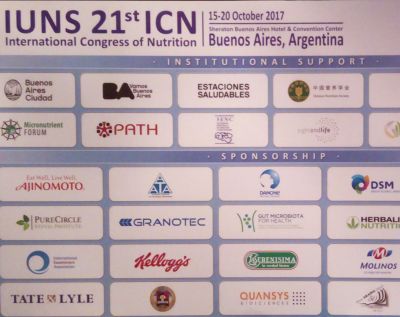Corporate sponsorship and health halo for ultra-processed products
Qualitative study on the 21st International Congress of Nutrition
Abstract
Objective
To describe the characteristics of corporate sponsorship during the 21st International Congress of Nutrition provided by food companies, and to analyse the measures proposed by the organizers to deal with prospective conflicts of interest.
Design
Qualitative study based on participant observation and document analysis.
Setting
21st International Congress of Nutrition, Buenos Aires, October 2017.
Analysis
The nutritional profile of the products advertised in the area of commercial exhibition was analysed according to the PAHO Nutrient Profile Model. The document analysis was based on the grounded theory to propose conceptual categories that organize the narratives on the aforementioned products.
Results
Large food corporations sponsoring the Congress advertised a selection of their products to health professionals and other participants attending the event. 92% of the exhibited food products were ultra-processed. 85% were high in added sugars, sodium, and/or saturated fats. Despite this unsuitable nutritional profile, narratives to endow ultra-processed products with a health halo were developed through three thematic axes: fortification with micro-nutrients, reformulation of products and symbolic reconversion of snacks by creating a positive assessment and removing negative connotations.
The measures adopted by the organization to deal with prospective conflicts of interests included space-time segmentation of activities and the requirement for the lecturers to submit a statement declaring their funding sources limited to each presentation. Space-time restrictions proved insufficient, and the declaration of funding sources was not a requirement for institutions organizing the symposia.
Conclusions
The influence of corporate sponsorship by food companies in the topics of scientific debate and dietary recommendations leads to questioning the efficacy of the measures adopted by the organizers to deal with the conflicts of interests. Said measures have been characterized as an institutionalized opacity policy.
It is necessary to define stricter standards to prevent sponsorship from companies that commercialize unhealthy products and/or that advertise products in an unsuitable way.

Authors retain all copyrights. In making a submission to World Nutrition, they are certifying that all material is theirs except quotations, as indicated, and that they have obtained permission for any photos, tables, or graphics taken from other publications or websites.




